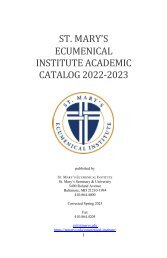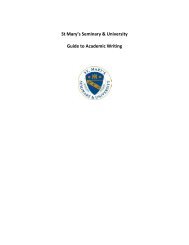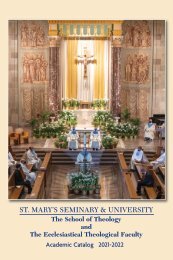EI Student Handbook 2022-2023
This Student Handbook supplements the current academic policies and procedures, which are published on our website. It also provides practical guidance for study and life within St. Mary’s Ecumenical Institute. We hope it serves as a tool of both communication and community.
This Student Handbook supplements the current academic policies and procedures, which are published on our website. It also provides practical guidance for study and life within St. Mary’s Ecumenical Institute. We hope it serves as a tool of both communication and community.
You also want an ePaper? Increase the reach of your titles
YUMPU automatically turns print PDFs into web optimized ePapers that Google loves.
In addition, all students are required to abide by the<br />
expectations outlined in the Community-Life<br />
Agreement (p. 11) and in the Community-Life<br />
Policies (pp. 33-37) in this handbook.<br />
<strong>Student</strong>s are expected to demonstrate the basic<br />
values of honesty and fairness in all matters. They<br />
are also expected to be respectful of others whose<br />
beliefs or opinions might differ from their own; this<br />
respect is to be communicated in both written and<br />
oral communication. Most importantly for an<br />
academic institution, all students are expected to<br />
practice academic integrity, as discussed below.<br />
Submission of Original Work and<br />
Retention of Copies<br />
It is customary for students to submit exams, papers,<br />
theses, and other projects to their instructors for<br />
evaluation during a course or as part of their<br />
culminating experience in a degree program. When<br />
work is submitted for evaluation, the student retains<br />
the intellectual property rights to that which has<br />
been created, but the original hand-written, typed, or<br />
word-processed document (or, for a thesis, the<br />
original and one copy) or other medium of work<br />
(e.g., electronic file) submitted becomes the<br />
property of St. Mary’s Seminary & University. In<br />
the case of course work, the instructor evaluates the<br />
submitted work and communicates the results of the<br />
evaluation to the student. The faculty member, at his<br />
or her discretion, may return the work to the student,<br />
retain the work, discard the work, or request that the<br />
administration retain the work or place the work in<br />
the student’s academic record. The administration<br />
of St. Mary’s also retains the right to request the<br />
original work from the instructor and may place it in<br />
the student’s academic record, store the work<br />
elsewhere (e.g., in the library or in a special<br />
collection of submitted projects), or discard the<br />
work if the student fails to retrieve it in a timely<br />
manner after being asked to do so.<br />
It is St. Mary’s policy to retain all student work<br />
about which the instructor or administration has<br />
raised questions of academic integrity, or that is (or<br />
is likely to be) the subject of a grade appeal.<br />
It is the student’s responsibility to retain a copy of<br />
all work submitted for evaluation, including written<br />
materials, electronic files, and work submitted on<br />
other media such as thumb drives.<br />
Academic Integrity and Plagiarism<br />
<strong>Student</strong>s are responsible for the honesty and<br />
truthfulness of all of their academic work and of all<br />
of their communication with faculty, administrators,<br />
and staff regarding any and all academic matters.<br />
Academic dishonesty in any form (cheating;<br />
plagiarism; fabrication of sources, information, or<br />
quotations; sharing one’s assignment with another<br />
student or collaborating with another student [or<br />
with other students] on an assignment without the<br />
professor’s expressed consent; submission of work<br />
other than one’s own; misrepresentation about<br />
academic experience, degrees, honors, etc.; and all<br />
other types of dishonesty regarding academic<br />
matters) is absolutely unacceptable and will not be<br />
tolerated.<br />
<strong>Student</strong>s should already have basic skills in library<br />
usage, reading and research, writing term papers,<br />
and acknowledging sources. Written work must be<br />
the student’s own, and each student must take care<br />
to give full documentation for all material quoted<br />
or paraphrased from other sources, including the<br />
Internet. Two standards for written work are:<br />
1. the most recent edition of Kate L. Turabian,<br />
A Manual for Writers of Term Papers,<br />
Theses, and Dissertations); and<br />
2. the most recent edition of Diana Hacker,<br />
Rules for Writers (Bedford/St. Martin’s).<br />
<strong>Student</strong>s should note that stringing a series of<br />
quotations and/or ideas from other sources together,<br />
even when they are properly documented, does not<br />
constitute an original paper. At the discretion of the<br />
professor, such work may be deemed a failure or<br />
returned for revision.<br />
All forms of academic dishonesty are serious<br />
offenses and grounds for grave consequences,<br />
which include one or more of the following: failure<br />
of the assignment, failure of the course, academic<br />
probation, and dismissal from the E.I.<br />
14







